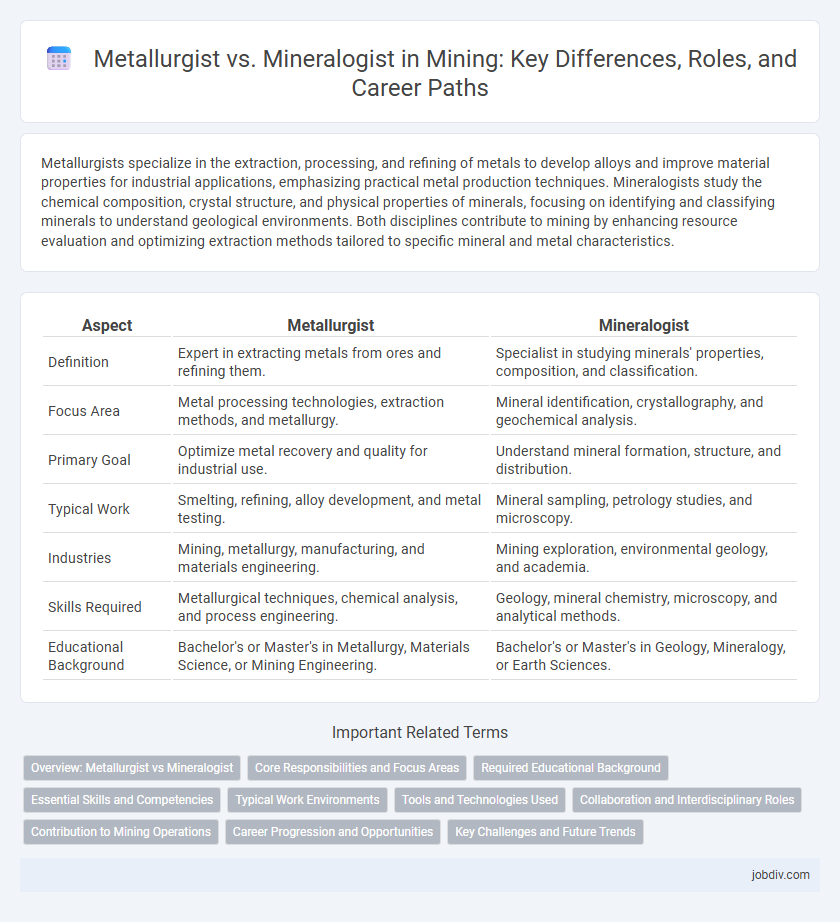Metallurgists specialize in the extraction, processing, and refining of metals to develop alloys and improve material properties for industrial applications, emphasizing practical metal production techniques. Mineralogists study the chemical composition, crystal structure, and physical properties of minerals, focusing on identifying and classifying minerals to understand geological environments. Both disciplines contribute to mining by enhancing resource evaluation and optimizing extraction methods tailored to specific mineral and metal characteristics.
Table of Comparison
| Aspect | Metallurgist | Mineralogist |
|---|---|---|
| Definition | Expert in extracting metals from ores and refining them. | Specialist in studying minerals' properties, composition, and classification. |
| Focus Area | Metal processing technologies, extraction methods, and metallurgy. | Mineral identification, crystallography, and geochemical analysis. |
| Primary Goal | Optimize metal recovery and quality for industrial use. | Understand mineral formation, structure, and distribution. |
| Typical Work | Smelting, refining, alloy development, and metal testing. | Mineral sampling, petrology studies, and microscopy. |
| Industries | Mining, metallurgy, manufacturing, and materials engineering. | Mining exploration, environmental geology, and academia. |
| Skills Required | Metallurgical techniques, chemical analysis, and process engineering. | Geology, mineral chemistry, microscopy, and analytical methods. |
| Educational Background | Bachelor's or Master's in Metallurgy, Materials Science, or Mining Engineering. | Bachelor's or Master's in Geology, Mineralogy, or Earth Sciences. |
Overview: Metallurgist vs Mineralogist
Metallurgists specialize in extracting metals from ores and refining them into usable materials, focusing on processes such as smelting, alloy production, and material properties analysis. Mineralogists study the chemical composition, crystal structure, and physical properties of minerals, often working to identify and classify mineral deposits. Both professions play crucial roles in the mining industry, with metallurgists optimizing metal extraction and processing, while mineralogists provide essential insights into mineral identification and geological context.
Core Responsibilities and Focus Areas
Metallurgists specialize in the extraction, refining, and processing of metals to enhance their properties for industrial applications, focusing on material performance, alloy development, and metal recovery techniques. Mineralogists concentrate on studying the chemical composition, crystallography, and physical properties of minerals, aiding in ore identification and evaluation for mining. The core responsibilities of metallurgists revolve around optimizing metal production processes, while mineralogists provide critical insights into mineral characteristics and ore genesis that guide exploration and mining operations.
Required Educational Background
Metallurgists typically require a bachelor's degree in metallurgical or materials engineering, emphasizing physical and chemical properties of metals, while mineralogists usually hold degrees in geology, earth sciences, or mineralogy, focusing on the study of minerals' structure and composition. Advanced positions in metallurgy often demand specialized knowledge in extractive metallurgy or materials processing, whereas mineralogists may pursue graduate studies concentrating on crystallography or geochemistry. Both fields benefit from strong foundations in chemistry, physics, and mathematics to analyze and optimize mining and mineral processing techniques.
Essential Skills and Competencies
Metallurgists require advanced knowledge in extracting and processing metals, emphasizing skills in materials science, quality control, and process engineering to optimize metal production. Mineralogists focus on identifying and analyzing mineral compositions, utilizing skills in geochemistry, crystallography, and microscopy to study mineral properties and occurrences. Both professions demand strong analytical capabilities, problem-solving, and proficiency with specialized laboratory techniques essential for mining operations.
Typical Work Environments
Metallurgists commonly work in industrial plants, research laboratories, and manufacturing facilities, where they focus on extracting and processing metals. Mineralogists typically operate in academic institutions, mining sites, and museums, studying minerals' composition and properties to guide exploration. Both professions require fieldwork, but metallurgists emphasize process optimization while mineralogists prioritize mineral identification and classification.
Tools and Technologies Used
Metallurgists utilize advanced technologies such as electron microscopes, X-ray diffraction (XRD) machines, and metallurgical furnaces to analyze metal properties, extract metals, and improve alloy compositions. Mineralogists rely heavily on polarizing microscopes, scanning electron microscopes (SEM), and automated mineralogy software to identify mineral structures, compositions, and mapping in geological samples. Both disciplines integrate spectroscopy and computerized data analysis tools, but metallurgists focus more on processing techniques while mineralogists prioritize mineral identification and characterization.
Collaboration and Interdisciplinary Roles
Metallurgists and mineralogists collaboratively enhance mining operations by integrating their expertise in material properties and mineral composition to optimize ore extraction and processing. Metallurgists focus on refining metals and improving extraction techniques, while mineralogists analyze mineral structures to identify valuable deposits and assess ore quality. Their interdisciplinary roles drive innovation in resource recovery, ensuring efficient, sustainable mining practices and maximizing economic yield.
Contribution to Mining Operations
Metallurgists optimize extraction and processing techniques to enhance metal recovery and improve ore refining efficiency in mining operations. Mineralogists analyze mineral composition and properties, providing critical data for ore identification and deposit evaluation. Together, their expertise ensures accurate resource assessment and maximizes the economic value of mining projects.
Career Progression and Opportunities
Metallurgists advance by specializing in extractive metallurgy, process optimization, and materials characterization, leading to roles like plant manager or research scientist in mining corporations. Mineralogists progress through expertise in mineral identification, crystallography, and geochemical analysis, which opens opportunities in exploration, academic research, and environmental consulting. Both careers offer pathways into leadership positions within mining operations, forensic labs, and resource development firms, driven by evolving technologies and global resource demands.
Key Challenges and Future Trends
Metallurgists face challenges in optimizing extraction processes and improving metal recovery rates while ensuring environmental sustainability, whereas mineralogists grapple with accurately characterizing complex mineral assemblages and assessing ore quality. Future trends in metallurgy emphasize advancements in hydrometallurgy and recycling technologies, while mineralogy is progressing through enhanced analytical techniques like machine learning-driven mineral identification and in-situ geochemical analysis. Integration of big data and AI-driven modeling is set to revolutionize both fields by enabling more precise resource estimation and efficient processing methods.
Metallurgist vs Mineralogist Infographic

 jobdiv.com
jobdiv.com